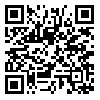Volume 12, Issue 12 (3-2015)
Nursing and Midwifery Journal 2015, 12(12): 1128-1138 |
Back to browse issues page
Download citation:
BibTeX | RIS | EndNote | Medlars | ProCite | Reference Manager | RefWorks
Send citation to:



BibTeX | RIS | EndNote | Medlars | ProCite | Reference Manager | RefWorks
Send citation to:
Valizadeh S, Fallahi Khoshknab M, Mohammadi E, Ebrahimi H, Arshadi Bostanabad M. NURSE’S PERCEPTION FROM BARRIERS TO EMPOWERMENT: A QUALITATIVE RESEARCH. Nursing and Midwifery Journal 2015; 12 (12) :1128-1138
URL: http://unmf.umsu.ac.ir/article-1-2069-en.html
URL: http://unmf.umsu.ac.ir/article-1-2069-en.html
Sousan Valizadeh1 
 , Masoud Fallahi Khoshknab2
, Masoud Fallahi Khoshknab2 
 , Easa Mohammadi3
, Easa Mohammadi3 
 , Hossein Ebrahimi4
, Hossein Ebrahimi4 
 , Mohammad Arshadi Bostanabad *5
, Mohammad Arshadi Bostanabad *5 


 , Masoud Fallahi Khoshknab2
, Masoud Fallahi Khoshknab2 
 , Easa Mohammadi3
, Easa Mohammadi3 
 , Hossein Ebrahimi4
, Hossein Ebrahimi4 
 , Mohammad Arshadi Bostanabad *5
, Mohammad Arshadi Bostanabad *5 

1- PhD in Nursing, Associate professor,Faculty of Nursing and Midwifery, Tabriz University of Medical Sciences, Tabriz, Iran
2- PhD in Nursing, Associate professor, Department of Nursing, University of social welfare and rehabilitation sciences, Tehran, Iran
3- PhD in Nursing, Associate professor, Tarbiat Modares University , Tehran, Iran
4- PhD in Nursing, Associate professor, Faculty of Nursing and Midwifery, Tabriz University of Medical Sciences, Tabriz, Iran
5- PhD Student, Faculty of Nursing and Midwifery, Tabriz University of Medical Sciences, Tabriz, Iran-(Corresponding Author) ,arshadi@tbzmed.ac.ir
2- PhD in Nursing, Associate professor, Department of Nursing, University of social welfare and rehabilitation sciences, Tehran, Iran
3- PhD in Nursing, Associate professor, Tarbiat Modares University , Tehran, Iran
4- PhD in Nursing, Associate professor, Faculty of Nursing and Midwifery, Tabriz University of Medical Sciences, Tabriz, Iran
5- PhD Student, Faculty of Nursing and Midwifery, Tabriz University of Medical Sciences, Tabriz, Iran-(Corresponding Author) ,
Abstract: (11297 Views)
Nurse’s perception from barriers to empowerment: A Qualitative research
Valizadeh S [1] , Fallahi Khoshknab M [2] , Mohammadi E [3] , Ebrahimi H [4] , Arshadi Bostanabad M [5] *
Received: 4 Nov , 201 4 Accepted: 8 Jun , 201 5
Abstract
Background & Aim: Development of a successful career in the field of organization is an important factor. L ack of it has implications for health policy, organizational structure and its performance . This study aimed to describe nurses' experiences of barriers to organizational empowerment.
Materials & Method: A qualitative design using a conventional content analysis approach was applied for data gathering and analysis. In this study, 18 nurses , and nurse directors in North-west of Iran were recruited through purposive sampling. Semi-structured interviews were conducted to collect the data.
Results: The data analysis result s are catogorized in 2 main categories (personal factors and organizational structure) and six subcategories: Dignity and value, non-client focused tasks, insufficient self-confidence, inadequate organizational support, lack of up-to-date knowledge, and professional motivation.
Conclusion: The study showed barriers affecting the ability of nurses who are often hidden in the quantitative studies. It seems that by dispel ling these barriers, the quality of nursing abilities can be improve d .
Keywords: Power, Nurses, Barriers
Address: Nursing & Midwifery Faculty, South Sharyati Ave, Tabriz, IRAN
Tel: (+98)41-34796770
Email: arshadi@tbzmed.ac.ir
[1] PhD in Nursing, Associate professor,Faculty of Nursing and Midwifery, Tabriz University of Medical Sciences, Tabriz, Iran
[2] PhD in Nursing, Associate professor, Department of Nursing, University of social welfare and rehabilitation sciences, Tehran, Iran
[3] PhD in Nursing, Associate professor, Tarbiat Modares University , Tehran, Iran
[4] PhD in Nursing, Associate professor, Faculty of Nursing and Midwifery, Tabriz University of Medical Sciences, Tabriz, Iran
[5] PhD Student, Faculty of Nursing and Midwifery, Tabriz University of Medical Sciences, Tabriz, Iran-(Corresponding Author)
Type of Study: Qualitative |
Subject:
Nursing
Send email to the article author
| Rights and permissions | |
 |
This work is licensed under a Creative Commons Attribution-NonCommercial 4.0 International License. |



 gmail.com, unmf
gmail.com, unmf